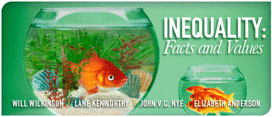Here’s a roundup of some notable blog posts in response to this month’s issue. Each post is longer than what I’ve quoted here — which tries only to give you an idea of where the author is headed. All are worth reading.
What good is money for? Well, in a liberal society, it’s good for two things: more things and more autonomy. The things part is down — as Will is quick to point, goods at the lower end of the consumption scale are cheaper and better working over the past few decades. So even if many consumers have not seen their incomes rise, they feel richer since the goods they are getting are cheaper. True dat!
What I’m more interested in is the autonomy end of it. What about the ability to leave an abusive partner or job without worrying about health care? Travel, spend more time with your family, feel a sense of financial security, etc? Here people less worried about income inequality would say that consumers are in better position to take advantage of this as well since they are richer.
So what they have a cheaper basket of certain goods. Now though autonomy isn’t commodified and sold on a market, the items that we associate with it, insurance, education, perhaps housing, have all seen skyrocketing prices, an effect that blocks out the first effect. This leaves consumers noticeably poorer than they would be otherwise. You’d need to construct a separate index and see the effects played out; I hope researchers are able to do that.
Economists breathed a collective sigh of relief when we saw data showing that GDP really does make people happier.
However, what if all that’s really going on is that the probability of very bad events is going down. That is, the richer you are the less likely your child is to starve to death, the less likely you are to find yourself with no home, the less likely you are to be trapped in an abusive family. These bad things go down and happiness goes up.
In other words Crusoe is happy when his coconut stockpile increases not because he actually going to eat 50,000 coconuts but because implicitly the probability of any series of bad events leaving him with no coconuts or only rotten coconuts goes down.
Let me be clear about what I think we’re saying here. It’s not simply that there is some reservation level of consumption and as people get further from it they are better off. It is that there are a whole range of bad things that could happen to you and higher income gives you the ability to self-insure against more and more of those things.
This can go pretty far. The flat screen and DVD collection insures you against boredom. The night [on] the town insures you against an unhappy mate. Lots of what we think of as happiness from consumption might simply be freedom from worry. In this sense income is not merely an input to consumption, it is a substitute for consumption. We should demand income in and of itself.
Peter Twieg of The Distributed Republic writes,
Elizabeth Anderson uses the phrase “spiteful competition” no less than four times. Does anyone have any idea what exactly this is supposed to mean? I could offer some guesses, but let’s see what she apparently believes about this concept:
- Conspicuous consumption is a form of spiteful competition
- Not all forms of status competition can be classified as spiteful competitionI’m at something of a loss here. Pure status competition in general is usually seen as a zero or negative-sum activity, and if displacing someone else on the social ladder isn’t spiteful, what is? Does it have to be accompanied by an upturned nose and catty banter in order to qualify? This strikes me as an important source of confusion in Anderson’s overall argument: What delineates “good” status competition from “bad” status competition? What forms of inequalities give rise to good versus bad forms of status competition?
It’s unclear whether Anderson actually believes that reducing income inequality would actually reduce status competition instead of just causing it to be expressed along some other dimensions of identity. Observe the trendy prevalence of food and environmental snobbery among certain parts of the American population – can anyone honestly say that these causes have not become broad cultural movements used in order to create “spiteful” hierarchies of social enlightenment? Anderson appeals to the lack of conspicuous consumption in Scandanavian countries, but does she believe that the fact that these countries have much greater status stratification by job title is completely coincidental? Or is this okay because, for whatever reasons, this sort of stratification isn’t done “spitefully”?

